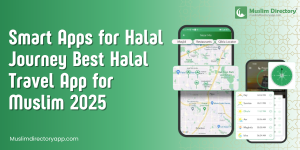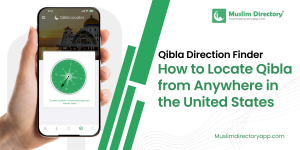In today’s fast-paced digital world, it can be hard to always follow Islamic rules. Many Muslims have a hard time following their religious routines because they have to work, care for their families, and hang out with friends. Islamic apps are now powerful tools that can change how we do our daily spiritual practices, making them easier to find, more consistent, and more meaningful.
These Muslim apps aren’t meant to replace traditional Islamic practices; they’re meant to help and improve them. These digital tools can help you be more consistent and effective in your daily practice of Islam. They can help you learn about Islam, pray at the right times, and meet other Muslims in your area.
If you know what the benefits of Islamic apps are, you can use technology in your spiritual life in ways that are real and meaningful, whether you’re a busy professional, a parent with a lot on your plate, or someone who wants to learn more about Islam and how to practice it.
1. Accurate and Convenient Prayer Time Management
Don’t ever miss a prayer time again
One of the best things about Islamic apps is that they can give you the exact prayer times for where you are right now. These apps automatically change for your location, daylight saving time, and even when you travel, unlike traditional methods that need you to do the math yourself or look at printed schedules.
Customizable Notification: You can set multiple reminders in most prayer times apps. One can remind you to get ready for prayer, and the other can remind you when it’s time to pray. This approach gets you ready mentally and physically instead of being surprised when it’s time to pray.
Different Ways to Calculate: Good Islamic apps let you choose from different ways to calculate prayer times (like ISNA or the Muslim World League). This lets you match the timing of your local mosque or the way you like to calculate prayer times.
Travel Adaptability: These apps automatically change prayer times for your new location when you travel, so you don’t have to worry about missing prayers or getting confused.
Better Prayer Experience
There are numerous Islamic applications that offer more than just prayer reminders. Additionally, they enhance the prayer experience:
Qibla Direction: Your prayers are always directed toward Mecca thanks to the integrated compass, which helps you determine the correct qibla direction wherever you are in the world.
Athan Audio: Prayer becomes more engaging with real athan calls that offer a variety of reciter options. This is particularly useful if you are praying by yourself or in an area with a low Muslim population.
Prayer Tracking: You can use specific applications to monitor your prayer frequency, which can help you identify trends and refine your spiritual practice.
2. Accessible Islamic Education and Learning
Learning at Your Own Speed
Islamic apps have changed the way people can get Islamic education. Now, you can get high-quality religious instruction 24/7, no matter where you are or what your schedule is.
Quran Study: There are many apps that offer full Quran texts with translations in several languages, audio recitations by famous qaris, and detailed tafsir (commentary) that helps people understand Islamic texts better.
Islamic History and Stories: Users can deepen their understanding of their faith by reading stories about prophets, exploring Islamic history, and learning about the lives of important Islamic figures.
Scholarly Lectures: Apps that let users listen to lectures by well-known Islamic scholars let them learn from experts they might never meet in person.
Structured Learning Programs
Numerous Muslim apps provide users with organized educational courses that lead them through methodical Islamic education:
Progressive curricula: Systematic classes that progressively build knowledge, starting with fundamental Islamic concepts and progressing to more complex theological ideas.
Personalized learning: AI-driven applications that create educational experiences that are tailored to your interests, learning style, and pace.
Interactive Features: Discussion boards, quizzes, and social learning tools that improve the effectiveness and engagement of Islamic education.
3. Strengthened Community Connections
Integration with the Local Community
Through Islamic applications, users can interact with local Muslim communities in ways that were previously unfeasible or impractical:
Mosque Finder: Easily find local mosques with information on special programs, forthcoming events, and prayer times.
Events Notifications: Stay informed about community gatherings, lectures, volunteer opportunities, and local Islamic events.
Halal Business Exploration: To support the local economy, look for Muslim-owned businesses, Islamic bookstores, and halal restaurants in your area.
Global Ummah Connection
These applications help users connect with the larger Muslim community around the world:
International Prayer Synchronization: To foster a sense of community, certain applications display the times of prayer for Muslims worldwide.
Cultural Exchange: Gaining access to Islamic materials from various traditions and cultures can help you better appreciate the diversity of Islam.
Charitable Giving: Websites that allow you to support the Muslim community worldwide by facilitating zakat and charitable contributions to causes all over the world.
4. Consistent Islamic Knowledge Building
Daily Learning Habits
Islamic applications are excellent at assisting users in forming regular daily study routines that, over time, progressively increase their understanding of Islam:
Hadith and Daily Verses: Applications that provide users with daily verses from the Quran or explanations of prophetic traditions aid users in progressively expanding their knowledge of Islam.
Bite-Sized Learning: Consistent Islamic education is possible even with little time thanks to brief, easily absorbed lessons that fit into hectic schedules.
Memory Tools: Apps that use spaced repetition and other tried-and-true learning strategies to aid in the memorization of the Quran, the development of Arabic vocabulary, and the retention of Islamic concepts.
Diverse Learning Resources
Availability of various forms of Islamic content on a single, practical platform:
Various Viewpoints: Exposure to various academic viewpoints and interpretations, which aids users in gaining a more sophisticated comprehension of Islamic principles.
Combining text, audio, and visual materials to accommodate varying learning styles and enhance the interest of Islamic education is known as multimedia learning.
Reference Resources: Simple access to collections of hadith, Islamic dictionaries, and other resources that facilitate in-depth research and comprehension.
5. Enhanced Spiritual Mindfulness and Reflection
Daily Spiritual Reminders
Muslim apps can help you be more mindful and spiritually aware all day long:
Dhikr Reminders: During hectic daily routines, automated reminders for daily dhikr (remembering Allah) aid in preserving spiritual awareness.
Inspirational Content: Daily Islamic sayings, passages, or contemplations that offer inspiration and spiritual sustenance all day long.
Gratitude Practice: Apps that encourage daily reflection on gratitude, assisting users in cultivating a more optimistic and spiritually conscious outlook.
Spiritual Goal Setting and Tracking
Features that assist users in setting and monitoring spiritual goals are present in many Islamic apps:
Tracking Habits: Monitor your consistency in praying, reading the Quran, donating to charities, and observing other Islamic customs.
Personal Reflection: Online diaries or reflection exercises that assist users in processing their spiritual development and difficulties.
Progress visualization: The use of charts and indicators to show users how their spiritual development has changed over time, inspiring them to keep growing.
6. Improved Family Islamic Education
Family Coordination
Islamic apps can help families coordinate their religious practices and education more effectively:
Shared Calendars: Family prayer schedules, Islamic event reminders, and religious observance planning that keeps everyone coordinated.
Children’s Islamic Content: Age-appropriate Islamic stories, games, and educational content that makes Islamic learning engaging for young family members.
Family Challenges: Apps that create family-friendly Islamic challenges or competitions that encourage family bonding around faith practices.
Parenting Support
Resources and tools that help Muslim parents raise children with strong Islamic values:
Parenting Guidance: Islamic parenting advice and resources based on Quranic teachings and prophetic traditions.
Educational Planning: Tools for planning children’s Islamic education, tracking their religious learning progress, and finding appropriate resources.
Cultural Preservation: Apps that help families maintain Islamic cultural traditions and pass them on to younger generations.
7. Practical Lifestyle Integration
Halal Living Made Easier
Islamic apps make it easier to maintain a halal lifestyle in today’s world in many ways:
Apps for identifying halal eateries: Checking product ingredients for halal compliance, and offering halal cooking advice and recipes are examples of halal food identification.
Islamic Finance: Resources that assist users in managing their money in accordance with Islamic principles, such as sharia-compliant investing, Islamic banking, and zakat computation tools.
Travel Planning: Resources for Muslim-friendly travel, such as places to pray, restaurants serving halal food, and places of interest for Muslims.
Time Management and Productivity
Combining contemporary time management and productivity with Islamic principles:
Schedule Organization: Tools for arranging daily schedules in accordance with Islamic duties and prayer times are available.
Goal Setting: Programs that integrate Islamic ideals and principles into frameworks for setting both personal and professional goals.
Work-Life Balance: Tools for upholding Islamic customs while juggling social and professional commitments.
Choosing the Right Islamic Apps
Quality and Authenticity Considerations
When selecting Islamic apps for your daily practice, consider:
Scholarly Credibility: Choose apps that cite reputable Islamic scholars and authentic sources for their content.
User Reviews: Look for apps with positive reviews from Muslim users who can verify the accuracy and usefulness of Islamic content.
Regular Updates: Apps that are regularly updated tend to have better accuracy, particularly for prayer times and religious calendar events.
Personal Needs Assessment
Consider your specific needs and circumstances:
Learning Style: Choose apps that match your preferred learning methods – visual, auditory, or interactive.
Time Availability: Select apps that offer content formats compatible with your available time for Islamic practice and learning.
Community Integration: If community connection is important to you, prioritize apps with strong social features and local community integration.
Best Practices for Using Islamic Apps
Maintaining Balance
While Islamic apps offer many benefits, it’s important to use them wisely:
Supplement, Don’t Replace: Use apps to enhance traditional Islamic practices rather than replacing in-person community involvement and human spiritual guidance.
Digital Detox: Balance app usage with periods of offline spiritual reflection and practice.
Quality Over Quantity: Focus on using a few high-quality Muslim apps consistently rather than downloading many apps that you use inconsistently.
Maximizing Benefits
To maximize the benefits of Islamic applications:
Frequent Use: Develop the habit of using the app regularly, rather than sporadically.
Active Learning: Take notes, reflect, and apply what you learn rather than merely reading or watching.
Community Sharing: To make useful content and information even more beneficial, share it with your loved ones.
Conclusion
In our modern world, where technology is ubiquitous, Islamic apps provide new ways to enhance and deepen daily Islamic practice. These digital tools can enhance your spiritual life and make it more consistent. They can help you keep track of your prayer times, get Islamic education, and connect with other people in your community.
The seven benefits listed—accurate prayer time management, easy access to Islamic education, stronger community ties, consistent knowledge building, greater spiritual mindfulness, better family Islamic education, and practical lifestyle integration—show how well-designed Muslim apps can help Muslims deal with many of the problems they face in keeping up with their faith in modern society.
However, the key to getting the most out of these tools is to use them as supplements to, not replacements for, traditional Islamic practices and community connections. Islamic apps can help you practice Islam more effectively, consistently, and with greater knowledge if used wisely. They can also help you stay in touch with both your local community and the global ummah.
As technology improves, Islamic apps will likely become even more effective and useful for daily Islamic practice. You can make smart choices about how to use these tools in your spiritual life by learning about their current benefits and best practices. This will help you strengthen your relationship with Allah and your Islamic community.
If you’re just starting to look into Islamic apps or want to get the most out of the ones you already have, keep in mind that the main goal is not to become more tech-savvy, but to deepen your faith, improve your character, and strengthen your connection to Allah and the Muslim community. When used with this goal in mind, Islamic apps can be helpful tools on your spiritual journey.










